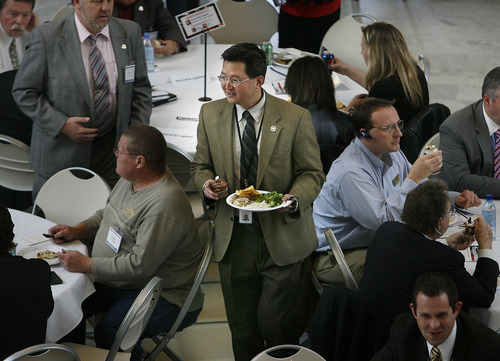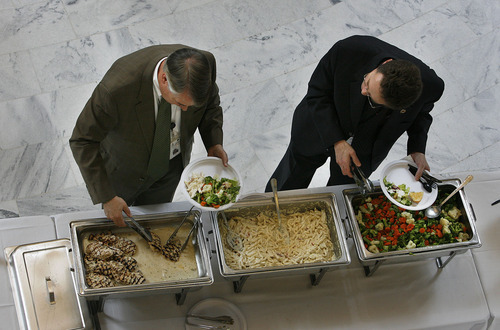This is an archived article that was published on sltrib.com in 2011, and information in the article may be outdated. It is provided only for personal research purposes and may not be reprinted.
Bill Tibbitts, director of the Crossroad Urban Center'sAnti-Hunger Project, says it is discouraging to accompany the homeless and poor to lobby Utah legislators when they see how special interests with money are wining and dining the elected officials.
"It's disheartening for people who have to scrape up bus fare to arrive in the Capitol and walk through an elaborate dinner that has been set up in the Rotunda" for lawmakers by special-interest groups, he says. "They say, 'We can't afford to do anything like that, so we're not going to have much success.' "
Special interests — almost all of whom would be affected by bills before the Legislature — have been busy feeding and entertaining Utah lawmakers this year, despite passage of ethics laws last year that were billed, in part, as efforts to reduce that.
Official social calendars for the Senate and House, obtained by The Salt Lake Tribune through an open-records request show that 101 groups have sponsored 112 events — breakfasts, lunches, dinners, snack breaks, concerts and shows — in which one entire chamber, or both, were invited this session.
Senators, for example, were offered sponsored lunches on 32 out of the 33 working days that they will be in session this year, all but on opening day.
As an example of events by groups trying to influence lawmakers, Thanksgiving Point on Wednesday offered legislators a free "family night" at its Museum of Ancient Life in Lehi. Thanksgiving Point has been seeking $1.5 million this year from the Legislature for a rain-forest museum.
On Feb. 3, Hill Air Force Base Heritage Museum also invited lawmakers for a free "family event." Hill Air Force Base has been seeking $100,000 from lawmakers this year for an air show. And on Feb. 7, the Living Planet Aquarium offered a buffet dinner and "family event" to lawmakers. It has been seeking $2.5 million from legislators this year.
The Utah Realtors Association invited all legislators to a luncheon that it catered in the Rotunda on Friday. At least 29 bills that would affect the real estate industry have been filed this year.
Others offering free events range from lobbying firms that represent multiple clients to companies and groups, including Comcast, Questar, EnergySolutions, Farmer's Insurance, Intermountain Healthcare, McDonald's, Wal-Mart, Parents for Choice in Education, the Utah Manufacturers Association and the Utah Hospital Association.
A complete list of all groups and the events that they sponsored is available online atsltrib.com.
Exactly which lawmakers attend the events is unknown, despite ethics reform last year that generally requires lobbyists to disclose the name of any legislator on whom they spend more than $10 a day.
Those reforms, however, have a loophole. They allow spending more than $10 on food and beverages for lawmakers any time that all members of the House, Senate or a committee are invited — and does not require listing by name who came.
However, rules still allow spending no more than $10 on legislators for such things as concerts and shows.
So social calendars sometimes warned legislators that attending some events would cost them money. For example, they were told that aJan. 28 Utah Symphony concert would cost them $12 to $36 a person — what tickets would cost beyond the $10 they could receive as a gift. They were told that a pre-concert reception at the Bambara restaurant would be free.
Similarly, they were told that a Jan. 27 play, "Born Yesterday," at Hale Centre Theatre would cost them $13 per person for tickets that would normally cost $23. A pre-play dinner at Little America sponsored by Intermountain Healthcare was free.
Ken Bullock, executive director of the Utah League of Cities and Towns, said his group sponsored a lunch for lawmakers because he feels it is an effective way to reach them.
"I think 80 to 90 percent of them came. We had very good representation," he said. Bullock adds that it allowed many local officials to meet with lawmakers at the same time, and build a feeling that they are on the same team to serve the same constituents.
"If we didn't have it, we'd be fine. But it helps," he said.
Not even critics of the current system believe that the free food and discount shows buy the votes of legislators. But they worry that it may buy preferential access to talk to them.
"I think that it is a way to be able to spend a lot of time with legislators. There aren't a lot of interruptions, they don't have anywhere to go, so they are a captive audience," said Linda Hilton, director of the Coalition of Religious Communities, a group that advocates for the poor, which Hilton said cannot afford to host events for legislators.
Tibbitts said Utah lawmakers do offer good access to groups such as his Anti-Hunger Project without the need to buy them food, but he thinks their acceptance of it by others hurts their image.
"People are skeptical that they will be listened to in the first place. And when they see what others do [in buying dinners], they figure they are the ones who will have influence," Tippitts said.
Kim Burningham, a former legislator who has helped lead an effort to put a campaign reform initiative on the 2012 ballot, said the system of buying dinners concerns him, but not as much as large, unlimited campaign contributions now allowed by law.
"The best legislation results from access being given for information from all sides. People with money who are able to put together an event may have more access than others, and that is concerning," he said. "But allowing huge donations by them without limit is more concerning."
Lawmakers themselves say the events don't sway them.
"When I come in here to vote, I don't think about — or even really know — who has bought us a dinner and who hasn't," said House Majority Leader Brad Dee, R-Ogden. He said events allow groups to talk about their concerns, but said lawmakers give other groups access, too.
Still, Senate Majority Leader Scott Jenkins, R-Plain City, said: "We had a discussion this year about whether we should even allow this stuff because we had a few people bring that up. We decided, yeah, we're going to allow it."
He said that besides Senate caucus lunches, he attends few events himself.
Similarly, Senate Minority Leader Ross Romero, D-Salt Lake City, said he doesn't have time to show up at many socials or receptions.
"They are helpful in helping us focus some time over the lunch hour," Romero said. "It also means we are distracted with eating, so we are probably not the best listeners during that time." Group and dinner events (pdf)





